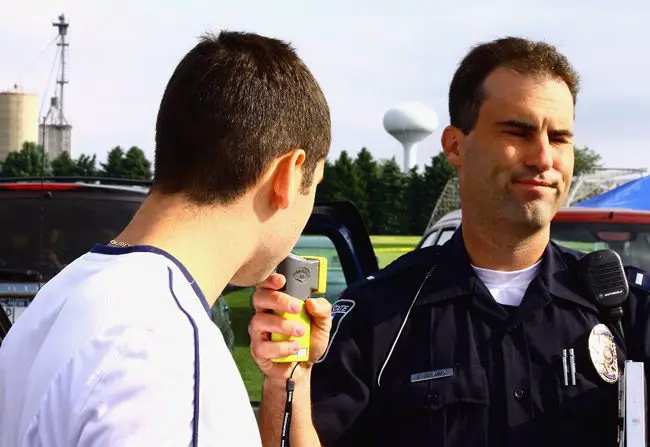
The Florida Supreme Court will hear arguments on Sept. 1 on the constitutionality of the state law that allow police to cite drivers who refuse to take a breathalizer or blood-alcohol test when suspected of drunk driving. The case, which originated in Volusia County, is drawing the attention of law enforcement and privacy advocates. Florida is one of just 13 states that make it a crime to refuse such a test.
But the Sept. 1 arguments before the Florida court may be rendered moot by a decision of the United States Supreme Court, expected by the end of June, on the same issue. The high court heard arguments in that case–Birchfield v. North Dakota–in late April. A majority of justices were skeptical about such laws. Three years ago, a majority of the court ruled that police may not draw blood from a suspect without a warrant. (A full treanscript of the arguments before the U.S. Supre,me Court is available here. Complete oral arguments can be heard here.)
“You’re asking for an extraordinary exception here,” Justice Anthony Kennedy told lawyers representing Minnesota and North Dakota, where the cases originated, and the federal government. “You’re asking for us to make it a crime to exercise what many people think of as a constitutional right.”
People arrested on suspicion of drunk driving routinely refuse the test, but are not always cited for the refusal. One such arrest in Flagler County took place over the Memorial Day weekend, when Eugene Powell, a 60-year-old resident of Palm Coast’s F Section, was charged with “operating a vessel while normal faculties impaired,” and booked at the Flagler County jail on the misdemeanor. A cop saw him operating jet ski in the waters off Bings Landing in the Hammock. He fell off the jet ski and was not able to help himself out of the water until a “good Samaritan” helped him out, according to his arrest report. Then came the cop, a Florida Fish and Wildlife Conservation Commission officer. Powell agreed to a field sobriety test, but not a breath test later. He was not cited for the refusal.
The Volusia-based case is an echo of the cases before the U.S. Supreme Court. The night of Oct. 4, 2013, William Williams was arrested in Volusia County for drunk driving and asked to submit to a breathalizer test, which he refused. The arresting officer did not have a warrant. Williams was issued five traffic citations, including one for refusal to submit to a test. (He’d refused a test in a previous arrest.) Williams filed a motion to dismiss the refusal charge, arguing that the state law that promulgates it is unconstitutional.
The Volusia County court denied his motion but posed a question that opened the way to his appeal: “If the implied[-]consent statute provides consent to search as an exception to the Fourth Amendment warrant requirement, then can that consent be withdrawn by refusal to submit to an otherwise lawful test of breath, blood or urine and can the
second such refusal be punishable as a criminal offense?” After Williams served two days in jail, he appealed.
Last June 5, a unanimous three-judge panel of the Fifth Circuit Court opf Appeal, which has jurisdiction in Flagler and Volusia counties, upheld the state law. “In sum,” the court ruled, “balancing Williams’ diminished expectation of privacy and the minimal invasiveness of the search against the State’s legitimate interest in curbing driving under the influence leads us to conclude that a post-arrest warrantless breath-alcohol test would have been permissible under the Fourth Amendment.” (See the decision below.)
As an indication of the interest in the issue, the News Service of Florida reports, the Supreme Court has approved requests by the Florida Police Chiefs Association, the Florida Prosecuting Attorneys Association and the National College for DUI Defense to file friend-of-the-court briefs, according to an online docket.
![]()
Click to access williams-v-florida.pdf





























Real says
So this is like the patriot act, if the govt says its for oir best interests now they can take away whatever rights they want
jadobi says
Flaglerlive, to clarify, in Florida a person can only be charged criminally for a refusal to submit to a breath test is on their SECOND or SUBSEQUENT refusal. The example of Eugene Powell doesn’t mention whether he has a previous conviction for DUI. If he hasn’t, he cannot be charged with the refusal in this incident. There needs to be an increasing penalty for those who continue to drink and drive when just an arrest does nothing. I get the argument the lawsuit is making; driving is a privilege and providing a breath test is an administrative rule, not law, so how can the second or subsequent refusal be a violation of administration rule and law?
Anonymous says
Basically the questions boils down to MUST you aid the Government in gathering evidence against you????
DaveT says
If your driving under the influence your toast anyway and should be locked up, DL suspended. The only evidence gathered is a person is driving over the legal limit and that should go on his driving and criminal record. The only government interest is protecting those that are on the road from being hit by someone that is stupid enough to drink and drive. I have no sympathy for a person driving drunk.
DaveT says
If your drive a car you follow the law when it comes to testing
http://www.leg.state.fl.us/statutes/index.cfm?App_mode=Display_Statute&URL=0300-0399/0316/Sections/0316.1932.html